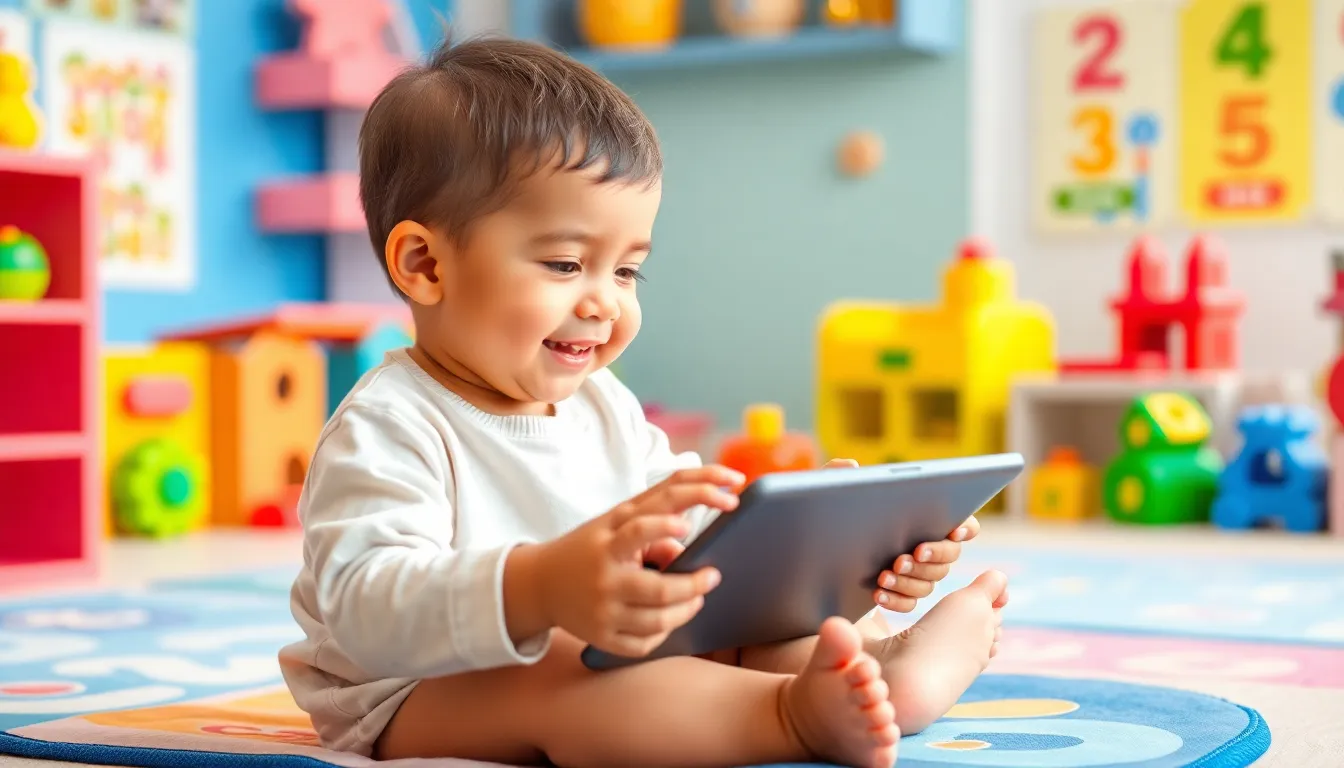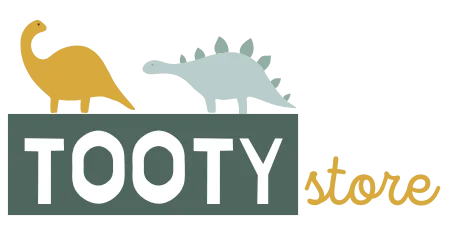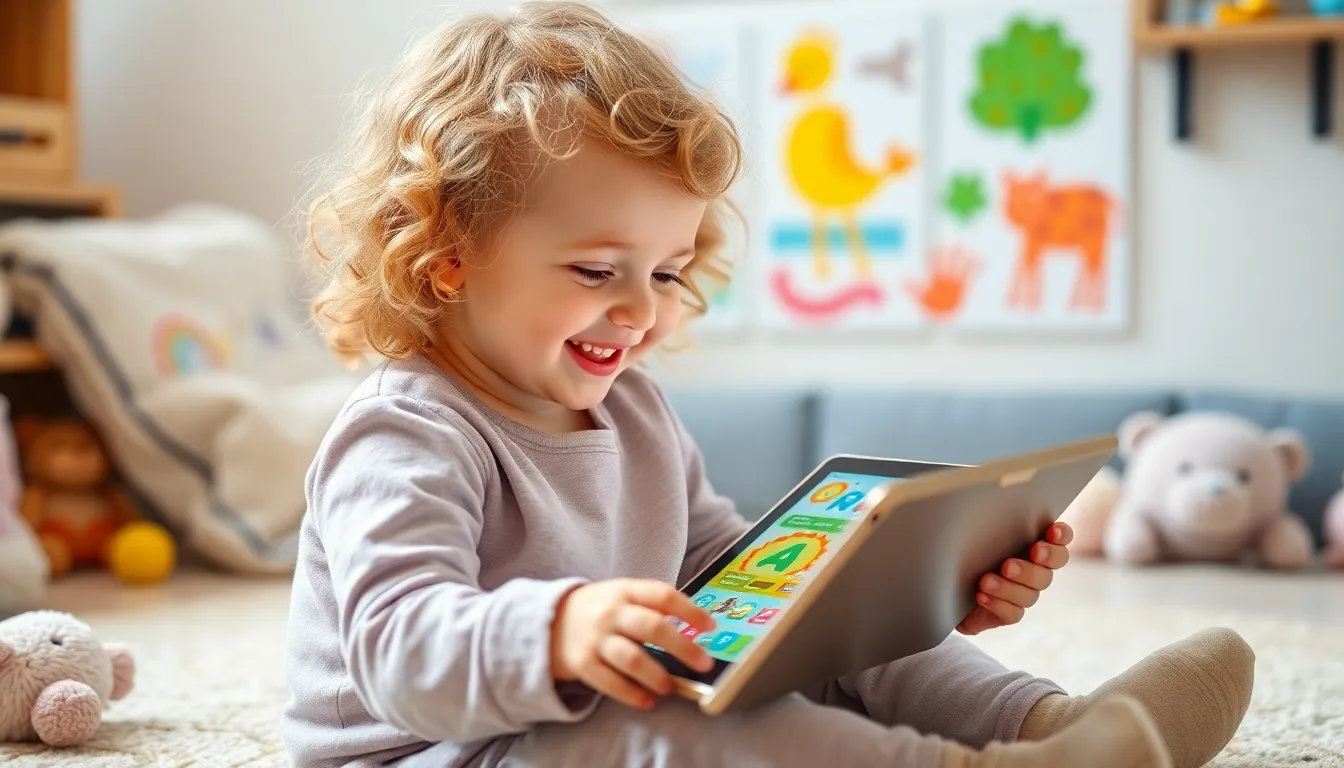Table of Contents
ToggleIn a world where toddlers wield tablets like seasoned pros, educational apps have become the superheroes of early learning. These digital wonders not only keep tiny fingers busy but also transform screen time into brain-boosting adventures. Imagine your little one giggling at a colorful app while mastering shapes, numbers, and letters—all without the hassle of crayon stains on the walls!
Overview of Educational Apps for Toddlers
Educational apps for toddlers serve as powerful tools that facilitate foundational learning. Engaging interfaces captivate young users, making learning enjoyable. Apps often cover essential skills such as shapes, numbers, and letters.
Many educational apps integrate interactive elements, which enhance comprehension and retention. Parents can choose from a variety of genres, including games, storytelling, and music. These genres encourage exploration and creativity while providing structured learning experiences.
Research shows that children learn better through play. Apps designed for toddlers promote curiosity and problem-solving, reinforcing cognitive development. Positive reinforcement within these apps motivates young learners to engage consistently.
Features like colorful graphics and catchy sounds capture toddlers’ attention effectively. Popular apps often include progress tracking, allowing parents to monitor their child’s achievements and areas for improvement. Tailored content adapts to each child’s learning pace, ensuring individual growth.
Educators recommend a balanced approach to screen time, emphasizing active interactions with apps. While apps provide numerous benefits, they should complement traditional learning methods. Diverse educational tools, both digital and physical, contribute to a well-rounded learning experience.
Overall, educational apps for toddlers combine entertainment and education, providing an invaluable resource for early development. In today’s digital landscape, these applications prioritize learning while keeping children engaged and excited.
Benefits of Educational Apps

Educational apps offer vital advantages in a toddler’s early learning journey. These tools turn screen time into meaningful educational experiences, making learning engaging and effective.
Enhancing Learning Through Play
Learning becomes enjoyable when play is integrated into educational apps. Interactive games, colorful graphics, and entertaining activities capture toddlers’ attention. Features like character rewards and achievements motivate exploration and creativity. Each app supports various learning areas, including numbers, letters, and problem-solving skills. Using these apps encourages a hands-on, playful approach that aligns with how young children learn best. Parents appreciate that playfulness fosters a positive attitude towards learning.
Promoting Cognitive Development
Cognitive skills receive a significant boost from educational apps. They help reinforce essential skills like critical thinking and memory retention through interactive experiences. Engaging animations and sound effects stimulate toddlers’ curiosity, encouraging them to ask questions. Regular use of these apps supports foundational skills that drive future learning. Progress tracking within the apps allows parents to monitor development, affirming their child’s achievements. Educators endorse the potential of these tools to reinforce traditional learning methods.
Popular Educational Apps for Toddlers
Numerous educational apps engage toddlers while promoting learning. These applications provide interactive experiences tailored to young children.
App Recommendations
- Endless Alphabet: This app introduces words and meanings through adorable animations and interactive puzzles.
- Breathe, Think, Do with Sesame: This app helps children manage feelings and practice problem-solving with fun activities.
- PBS Kids Games: Featuring characters from popular shows, this app offers various games that foster creativity and critical thinking.
- Monkey Preschool Lunchbox: It’s designed around fun activities that teach essential skills like counting and color recognition.
- Starfall Learn to Read: This app promotes literacy through engaging stories and phonics exercises.
Features to Look For
Look for apps with user-friendly interfaces that toddlers can navigate easily. Engaging visuals and sounds capture attention while enhancing interest. Educational content should support age-appropriate learning goals like language acquisition and early math skills. Progress tracking features help parents monitor development and celebrate milestones. Offline capabilities extend usability in various environments without relying on internet access. Always prioritize interactive elements that promote active participation, ensuring meaningful engagement for young learners.
Safety and Screen Time Considerations
Safety remains a top priority when selecting educational apps for toddlers. Parents should search for apps that comply with age-appropriate content guidelines, ensuring suitability for young learners. Content moderation plays a key role in safeguarding children from inappropriate material.
Screen time limits are equally essential. Experts suggest that toddlers should engage with screens for no more than one hour of high-quality programming daily. This guideline helps balance educational benefits with the potential physical and social downsides of excessive screen time.
Engagement through interactive features is crucial, as it can lead to productive learning experiences. Simple interfaces promote independent exploration, allowing toddlers to interact with content at their own pace. Consistent supervision by parents enhances this experience, reinforcing the learning process while teaching children about safe online practices.
Feedback mechanisms within apps, such as progress tracking, enable parents to monitor developmental milestones. Parents can evaluate whether the learning is effective and rewarding for their child.
Quality ratings from app stores often indicate safety and educational value. Research indicates higher-rated educational apps provide better experiences for toddlers, focusing on skill development within safe environments.
Setting boundaries around app use encourages healthy habits. Designating specific times for educational app engagement can cultivate a balanced routine, integrating learning and play effectively. Regular discussions about content and app experiences with toddlers help instill awareness about digital literacy from an early age.
Selecting the right educational apps requires careful consideration of both safety and screen time. Prioritizing these aspects creates a more enriching and secure learning environment for toddlers in today’s digital age.
Educational apps for toddlers represent a significant advancement in early learning. They transform traditional screen time into valuable educational experiences that foster curiosity and creativity. By making learning enjoyable through interactive elements and engaging visuals, these apps support essential skills development while allowing parents to monitor progress effectively.
With a variety of options available, parents can choose apps that align with their child’s interests and learning needs. Prioritizing age-appropriate content and setting healthy screen time boundaries ensures that these tools enhance rather than hinder development. Embracing educational apps can provide toddlers with a strong foundation for future learning while keeping them entertained and engaged.




